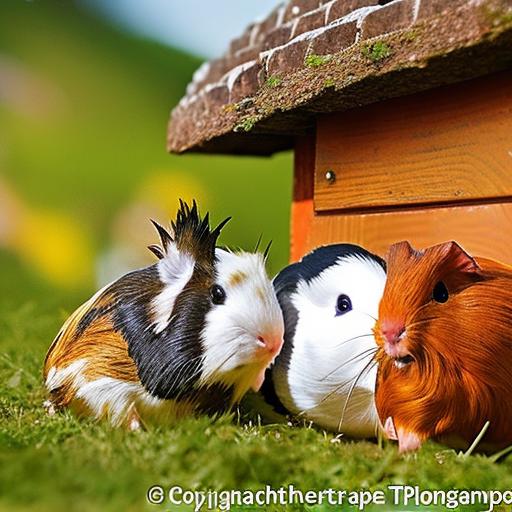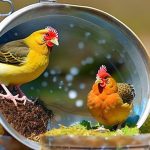Keeping chickens and guinea pigs together may seem like an unusual combination, but it can actually be a great idea for many reasons. As someone who has personal experience with keeping these animals together, I can attest to the benefits and joys that come with it. In this article, we will explore the benefits of keeping chickens and guinea pigs together, understand their behavior, learn how to create a safe living environment for both animals, discuss feeding requirements, address health concerns, and provide tips for managing their social dynamics. By the end of this article, you will have a comprehensive understanding of how to successfully keep chickens and guinea pigs together.
Key Takeaways
- Keeping chickens and guinea pigs together is possible and can be beneficial.
- Chickens and guinea pigs have different behaviors that need to be understood.
- A safe and suitable living environment is important for both animals.
- Feeding requirements for chickens and guinea pigs differ and should be considered.
- Health concerns and preventative measures should be taken seriously.
Benefits of keeping chickens and guinea pigs together
One of the main benefits of keeping chickens and guinea pigs together is natural pest control. Chickens are known for their ability to eat insects and pests, which can help keep your garden free from unwanted critters. Guinea pigs, on the other hand, are not as effective at pest control but can still contribute by eating certain types of vegetation that may attract pests. By having both animals in your backyard, you can create a natural balance that helps maintain a healthy garden.
Another benefit of keeping chickens and guinea pigs together is companionship for both animals. Chickens are social creatures that thrive in the company of others. Guinea pigs are also social animals that enjoy the presence of their own kind. By keeping these animals together, they can provide each other with companionship and reduce feelings of loneliness or boredom.
Additionally, keeping chickens and guinea pigs together can provide fertilizer for your garden. Both animals produce manure that can be used as a natural fertilizer. Chicken manure is high in nitrogen, while guinea pig manure is rich in phosphorus and potassium. By composting their manure properly, you can create nutrient-rich soil that will benefit your plants.
Understanding the behavior of chickens and guinea pigs
Chickens and guinea pigs have different behaviors and ways of interacting with each other. Chickens are highly social animals that establish a pecking order within their flock. They communicate through vocalizations, body language, and pecking. Chickens also have a natural instinct to scratch and forage for food, which can sometimes lead to them digging up plants or creating dust baths.
Guinea pigs, on the other hand, are more docile and less territorial than chickens. They communicate through vocalizations, body language, and scent marking. Guinea pigs are herbivores and spend a significant amount of time eating and grazing on vegetation. They also enjoy hiding in tunnels or shelters for safety and security.
When chickens and guinea pigs are kept together, they may interact with each other in various ways. Chickens may be curious about the guinea pigs and may try to peck at them or investigate their presence. Guinea pigs, on the other hand, may be wary of the chickens and may try to avoid them or seek shelter when they feel threatened. It is important to monitor their interactions and ensure that both animals feel safe and comfortable in their shared living environment.
Creating a safe and suitable living environment for both animals
Creating a safe and suitable living environment is crucial when keeping chickens and guinea pigs together. Both animals have specific housing requirements that need to be met in order for them to thrive.
Chickens require a secure coop or henhouse that provides protection from predators such as foxes, raccoons, or birds of prey. The coop should have proper ventilation, nesting boxes for laying eggs, perches for roosting, and access to an outdoor run where they can scratch and forage. It is important to provide enough space for the chickens to move around comfortably and engage in natural behaviors.
Guinea pigs also require a secure enclosure that protects them from predators and provides enough space for them to move around. The enclosure should have solid walls or wire mesh to prevent escape and should be placed in a shaded area to protect the guinea pigs from extreme temperatures. Guinea pigs also need hiding places such as tunnels or shelters where they can retreat to when they feel threatened.
When creating a shared living space for chickens and guinea pigs, it is important to provide separate areas for each animal. This can be achieved by dividing the enclosure into different sections or using wire mesh to create separate spaces. This allows each animal to have their own territory and reduces the risk of aggression or stress.
Feeding requirements for chickens and guinea pigs
Chickens and guinea pigs have different dietary needs that need to be met in order for them to stay healthy. Chickens are omnivores and require a balanced diet that includes grains, vegetables, fruits, and protein sources such as insects or worms. They also require access to grit, which helps them digest their food properly.
Guinea pigs, on the other hand, are herbivores and require a diet that consists mainly of hay, fresh vegetables, and a small amount of pellets. They also need access to fresh water at all times.
When feeding chickens and guinea pigs together, it is important to provide separate feeding areas for each animal. This can be achieved by using feeders that are designed specifically for each species or by placing their food in different locations within the enclosure. This ensures that each animal gets the appropriate amount of food and reduces the risk of competition or aggression.
It is also important to provide fresh water for both animals at all times. Chickens and guinea pigs require clean water to stay hydrated and maintain their overall health. Water should be provided in containers that are suitable for each species, such as waterers with nipples for chickens and water bottles or bowls for guinea pigs.
Health concerns and preventative measures

Both chickens and guinea pigs are susceptible to certain health issues, and it is important to take preventative measures to keep them healthy.
Common health issues for chickens include respiratory infections, parasites, egg-laying problems, and injuries. To prevent respiratory infections, it is important to provide proper ventilation in the coop and keep the bedding clean and dry. Regular deworming and checking for external parasites can help prevent infestations. Providing a balanced diet and ensuring that hens have access to calcium can help prevent egg-laying problems. Regular health checks and prompt treatment of any injuries or illnesses are also important.
Guinea pigs are prone to dental problems, respiratory infections, skin conditions, and obesity. Providing a diet that includes plenty of hay can help prevent dental issues. Proper ventilation and cleanliness in their enclosure can help prevent respiratory infections. Regular grooming and checking for any signs of skin conditions can help prevent or address any issues. Providing a balanced diet and regular exercise can help prevent obesity.
Regular check-ups with a veterinarian who is experienced in treating both chickens and guinea pigs are important for maintaining their overall health. Vaccinations, parasite prevention, and routine examinations can help catch any potential health issues early on.
Introducing chickens and guinea pigs to each other
When introducing new animals to each other, it is important to do so gradually and under controlled circumstances. This allows them to become familiar with each other’s presence without feeling threatened or stressed.
Start by placing the new animal in a separate enclosure within the shared living space. This allows them to see and smell each other without direct contact. After a few days, you can start introducing them through a wire mesh or fence that separates them but allows them to interact safely.
Monitor their interactions closely during this time. Look for signs of aggression or stress, such as excessive pecking or chasing. If any signs of aggression are observed, separate the animals and try again at a later time. It may take several attempts before they become comfortable with each other.
Managing social dynamics between chickens and guinea pigs
Managing social dynamics between chickens and guinea pigs is important to ensure that both animals feel safe and comfortable in their shared living environment.
If conflicts arise between the animals, it is important to intervene and separate them if necessary. This can be done by providing separate areas within the enclosure or by using wire mesh to create barriers. It is also important to provide enough space for both animals to move around comfortably and engage in natural behaviors. This reduces the risk of competition or aggression.
Promoting positive interactions between chickens and guinea pigs can be achieved by providing enrichment activities that stimulate their natural instincts. This can include providing scratching areas for chickens or hiding places for guinea pigs. It is also important to provide plenty of fresh food and water for both animals to reduce competition.
Cleaning and maintenance of the living space
Keeping the living space clean is essential for the health and well-being of both chickens and guinea pigs. Regular cleaning and maintenance help prevent odors, pests, and the spread of diseases.
Remove any soiled bedding or droppings from the enclosure on a regular basis. Replace bedding as needed to keep it clean and dry. Regularly clean and disinfect feeders, waterers, and any other equipment used in the enclosure.
To prevent odors, consider using absorbent bedding materials such as straw or wood shavings. Regularly ventilate the enclosure to allow fresh air to circulate.
To prevent pests such as flies or mites, regularly inspect the enclosure for any signs of infestation. Clean up any spilled food or water promptly to avoid attracting pests.
The joys of keeping chickens and guinea pigs together
In conclusion, keeping chickens and guinea pigs together can be a rewarding and enjoyable experience. The benefits of natural pest control, companionship, and fertilizer for the garden make it a practical choice for many backyard enthusiasts. Understanding the behavior of both animals, creating a safe living environment, providing appropriate feeding requirements, addressing health concerns, and managing their social dynamics are all important aspects of successfully keeping chickens and guinea pigs together. With proper care and attention, these animals can coexist harmoniously and bring joy to your backyard. So why not give it a try?
If you’re considering keeping chickens and guinea pigs together, it’s important to understand the compatibility between these two animals. While they can coexist peacefully, there are certain factors to consider. In a related article on Poultry Wizard, you can find valuable insights on how to successfully keep chickens and guinea pigs together. The article discusses the benefits of providing a suitable living environment, such as the Producers Pride Sentinel Chicken Coop, which offers ample space and protection for both chickens and guinea pigs. To learn more about creating a harmonious living arrangement for these adorable pets, check out the article here: https://poultrywizard.com/keeping-chickens/producers-pride-sentinel-chicken-coop/.
FAQs
Can you keep chickens and guinea pigs together?
Yes, it is possible to keep chickens and guinea pigs together in the same enclosure. However, there are certain considerations that need to be taken into account before doing so.
What are the considerations when keeping chickens and guinea pigs together?
Chickens are larger and more dominant than guinea pigs, so it is important to ensure that the guinea pigs have enough space to escape from the chickens if necessary. Additionally, chickens can carry diseases that can be harmful to guinea pigs, so it is important to keep the enclosure clean and to monitor the health of both species.
What kind of enclosure is suitable for keeping chickens and guinea pigs together?
The enclosure should be large enough to accommodate both species comfortably, with plenty of hiding places and separate areas for feeding and sleeping. It should also be secure to prevent predators from getting in and to prevent the chickens from escaping.
What should you feed chickens and guinea pigs when they are kept together?
Chickens and guinea pigs have different dietary requirements, so it is important to provide separate food and water sources for each species. Chickens require a diet that is high in protein, while guinea pigs require a diet that is high in fiber.
What are the benefits of keeping chickens and guinea pigs together?
Keeping chickens and guinea pigs together can provide both species with companionship and enrichment. Chickens can help to keep the enclosure clean by eating insects and other pests, while guinea pigs can help to keep the grass trimmed by grazing. Additionally, both species can benefit from the warmth and protection provided by the other.
Meet Walter, the feathered-friend fanatic of Florida! Nestled in the sunshine state, Walter struts through life with his feathered companions, clucking his way to happiness. With a coop that’s fancier than a five-star hotel, he’s the Don Juan of the chicken world. When he’s not teaching his hens to do the cha-cha, you’ll find him in a heated debate with his prized rooster, Sir Clucks-a-Lot. Walter’s poultry passion is no yolk; he’s the sunny-side-up guy you never knew you needed in your flock of friends!







